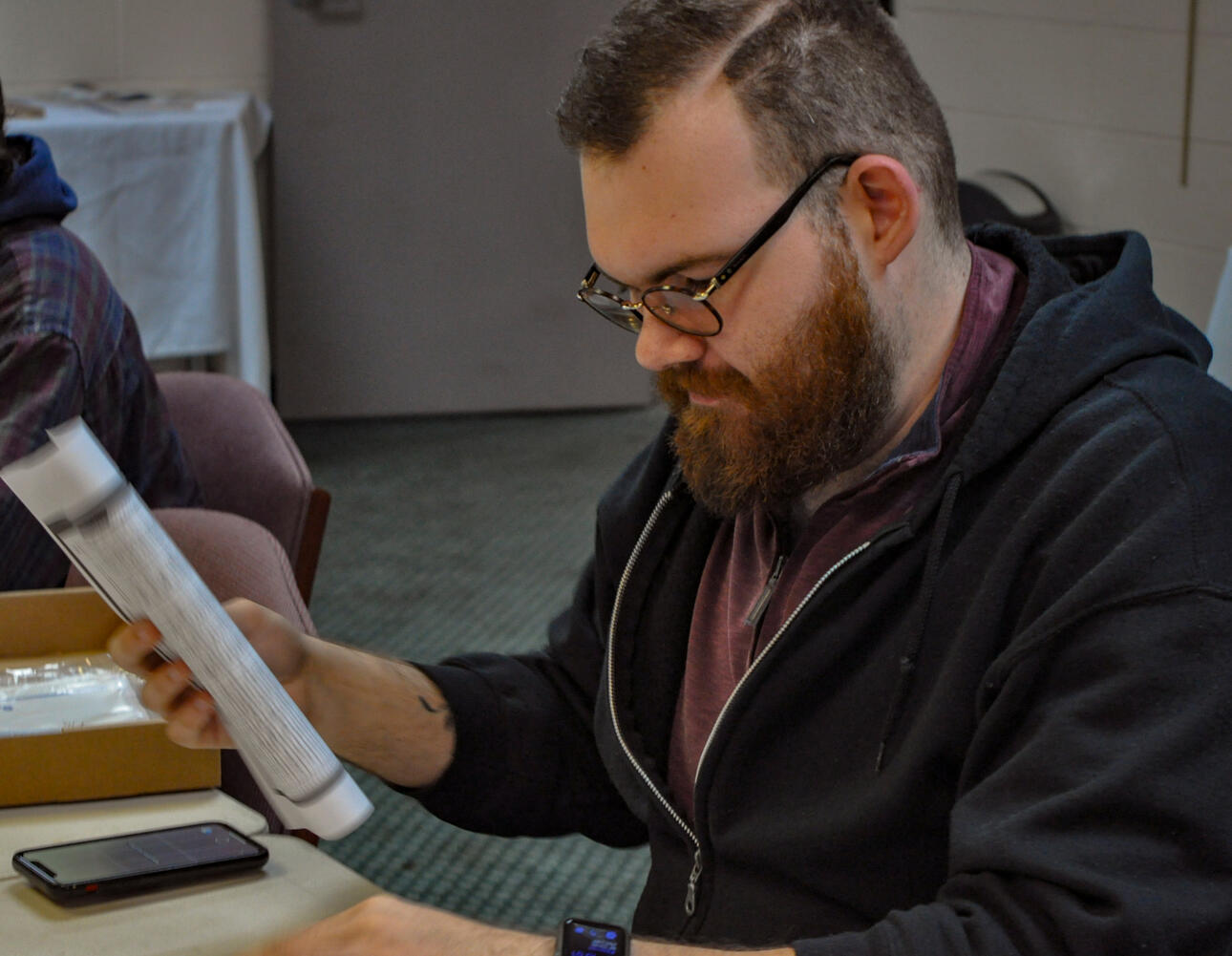portfolio
Andrew Pemberton
Balancing theory and practice to craft engaging learning experiences.

Prefer to hear about me? Check out this podcast!
about.
I have worked as an instructional designer for nearly 5 years. I found my footing in this industry reviewing instructional materials as a government contractor. I worked my way up from quality assurance to instructional design and before I knew it I was designing, developing, implementing, and evaluating training for such clients as the US Navy, Housing and Urban Development, and private organizations. Now, I practice instructional design at Jacksonville University. In 2024, I started my Ed.D in Instructional Systems and Performance Technology at Florida State University. My research interests center around information literacy, digital literacy, and accessibility.

education.
degrees.
Doctor of Education | Instructional Systems and Performance Technology
Florida State University | Expected April 2027Master of Arts | History
University of North Florida | August 2018 - May 2020Bachelor of Arts | History, Education
University of North Florida | June 2015 - April 2018
certificate.
Graduate Certificate | Learning Design and Technology
University of Maryland Global Campus (via edX) | February 2021 - January 2022
experience.
Full-time
Jacksonville University | Instructional Designer (2023 - Present)A. Harold and Associates | Quality Control Specialist II, Computer-based Training Specialist (2020-2023)Contract
News Revenue Hub | Research Consultant (2024)Northwest Council for Computer Education | Professional Learning Specialist (2024 - Present)
certifications.

Microsoft Innovative Educator Expert (2024-2025)
Google Certified Educator Lvl. 1 (2023-2026)
CITI Program: FSU Faculty, Staff, and Students - Social/Behavioral Research (2024-2027)
CITI Program: Jacksonville University - Social-Behavioral-Educational Research (2024-2027)
Microsoft Flip Certified Educator Lvl. 1 (Iss. 2024)
publications.
Pemberton, A. (2020). Invading eden: Exotic pets and invasive species in south Florida. Florida Historical Quarterly, 97, 1 & 2. Available at https://stars.library.ucf.edu/fhq/vol99/iss1/8 (discussed on Florida Frontiers and NPR, 06/17/2022: https://myfloridahistory.org/frontiers/radio/program/471)Pemberton, A. (2020). Of no safe harbor: North American maroons and their environment. Florida Conference of Historians Annals, 27.
Available at http://www.floridaconferenceofhistorians.org/uploads/1/8/2/8/18284773/fchvol27.pdfMendoza, F., Bullard, L, Pemberton, A., & Sheffler, D. (2020). Red Hill Cemetery project: Creating a cultural heritage database. 2020 SOARS Virtual Conference.
Available at https://digitalcommons.unf.edu/soars/2020/spring_2020/69/
honors & awards.
Editing Press | Laura Bassi Scholarship (Aug. 2024)
A. Harold & Associates, LLC | All Star Player Award (Feb. 2022)
A. Harold & Associates, LLC | All Star Player Award (Aug. 2020)
University of North Florida | Outstanding Graduate Student Award (May 2020)
Phi Alpha Theta | Best Graduate Paper Prize (Feb. 2019)
University of North Florida | TESOL Scholarship
organizations & affiliations.
Center for Information, Technology, and Public Life (Affiliate)
Association for Educational Communications and Technology (Member)
Northwest Council for Computer Education (Contractor)
ID2ID Peer Mentoring Program (Peer Mentor)
Phi Alpha Theta (Alumni; positions held: President, Vice-President, Historian)
National Residence Hall Honorary
testimonials.
"Having worked with Andrew at Jacksonville University, I can say being a colleague with Andrew has been an absolute pleasure.Andrew is an incredible learning designer. Every decision he makes considers established theory, needs of the learner, and beautiful design and innovation. He collaborates exceptionally well with subject-matter experts and coworkers, and balances the needs of numerous projects and obligations with authority, organization, and ease. He contributes to dialogues, ideations, and departmental initiatives with fresh ideas, insights and approaches. He meets all deadlines and is a clear and concise communicator.Andrew is also a lifelong learner- constantly investing in his own professional learning and growth. Since I have known Andrew, he has constantly been pursuing additional certifications, education, and opportunity. Andrew is also an engaging presenter, always tying in the learning to real-life examples and needs.Andrew is always conscientious about creating accessible and inclusive learning opportunities. He shares his knowledge and expertise with humility, and is incredibly collaborative and approachable.Most importantly, Andrew is the type of learning designer we need in the age of AI. Andrew is comfortable pushing boundaries and going above and beyond to ensure his learners meet the intended learning objectives in a unique, relevant, and engaging manner. He is full of new ideas, approaches, and insight, and his flexibility helps ensure all projects are completed on-time, with high quality and impeccable presentation.I highly recommend Andrew for work involving the learning sciences and design. His expertise will benefit any organization."

John L. Pauls,
Ed.D, MBA, MCE
"Andrew was extremely helpful, professional, and creative throughout the whole process! We met several times to make a gameplan, check in on my progress, or brainstorm ideas. I felt supported along the whole way!Andrew made excellent suggestions and was an amazing sounding board for me! Andrew also was extremely helpful when we recorded the videos and throughout the editing process - communicating with [the video production team]! I have implemented the activity in my class, and it has been very helpful for students to better understand the research process.Also, thanks to this activity, students can keep going back to the videos and rewatch them, whenever they need to be reminded of our objectives for the research proposals we are creating in this class. Overall, the activity has been really impactful for my students! Thank you!"

Irina T. Toteva,
Ph.D
"Andrew regularly demonstrates his ability to meet various technical challenges on his projects at a high level of quality and attention to detail. Andrew is an excellent communicator: If he doesn't understand a task, he will ask for a clarification rather than guess wrong. (It cannot be overstated how important this kind of communication is in our work-from-home environment.) Andrew is also able to quickly learn new skills, apply them to his work, and share his knowledge with others on the team. ... Andrew is very motivated to develop his ISD skills and learn more about contracting. He has been training himself on ISD principles and is ... getting certified. He regularly brings new ideas for technical solutions and volunteers for tasks and extra duties such as testing productivity software and acting as the go-to expert if the software is implemented by the team.
...
Andrew's contributions are vital and much appreciated. His focus on quality, communication and integrity reflect [company's] mission and values. He is eager to learn, lead and make a difference on his projects. Andrew is a much appreciated "force multiplier" on his projects, and his PM can't wait to see where his talents will take him next."

Jon Worth,
PMP, M.A
"The [instructional design] experience was challenging due to a short timeline to plan and execute. However, I think if one steps back and looks, any longer and the impact would not be felt in the course because of time lag. The introduction of all our projects was a strong part of the experience. Although designers and learners worked in silos, the first day meeting let us all know what types of projects and the varied areas of application.Andrew was very easy to work with, prompt and supportive... He is a gifted designer, and I am thankful for the experience. He made it fun, manageable, enlightening and we made a delightful collaborative course unit.Looking forward to working with him on other future projects."

Dana C. Tupa
Associate Dean
portfolio.
analysis & design.
Jacksonville University DEI and Inclusive Teaching Internal Training Course
Overview: For this project, I used the Dick & Carey model of instructional design for an internal training course on diversity, equity, and inclusion as it pertains to teaching in higher education. This course was implemented to Jacksonville University instructors and faculty campus-wide. The original design was hosted in Blackboard, but following the completion of this design document I created an additional module in Rise360.Terminal learning Objective: By the end of the course, faculty at Jacksonville University will be able to apply inclusive
teaching concepts in their courses using a JU-provided checklist.Audience: Jacksonville University instructors and faculty.Role of Instructional Designer: Front-end analysis, Needs analysis, Project manager, Instructional design, development, Blackboard implementation, Evaluation, Media designerInstructional Design Considerations: #Dick&Carey #eLearning #asynchronouslearning #andragogy
design & development.
A Quick Note on Storyline Files: You may notice that the Storyline player's navigation controls look squished. This is an issue with the website I used to host my portfolio, not my files/uploads. The controls still function as intended.
Pedagogy of the Arts: Storyline Module
Terminal Learning Objective: By the end of the module, FA-552 students will be able to compare and contrast the instructional strategies, benefits, and challenges of asynchronous and synchronous learning environments.Tools Used: Articulate Storyline, Canva, Blackboard UltraRoles of the Instructional Designer: Project manager, instructional designer, learning developer, subject matter expertAbout this Project: This project was completed in October 2024 as a part of the Change1Thing initiative, where instructional designers collaborate with faculty to enhance one aspect of their course. In this case, my collaborator, an art professor and college Dean, wanted to add a digital pedagogy component to her graduate course on Pedagogy of the Arts. I suggested that we create a new module in the course, including a Storyline module on asynchronous vs. synchronous learning, a list of assigned readings (chosen by the professor), and a list of technological resources that students can explore and potentially utilize in their own teaching practices. For assessment, the Storyline module contains two practice assessments and the LMS contains a reflection exercise. I modeled the Storyline module on the professor's portfolio, using photos of her art as backdrops for the slides. Additionally, I used Canva to isolate pieces of her ceramic sculptures and designed practice assessments that fit the themes of the sculptures.
Introduction to Psychology: Classical and Operant Conditioning
Learning Objectives: By the end of the module, PSYC101 students will be able to explain how classical conditioning occurs; explain how operant conditioning occurs; distinguish among positive and negative reinforcement and punishment.Tools Used: Articulate Storyline, Canva, Blackboard UltraRoles of the Instructional Designer: Project manager, instructional designer, learning developer, subject matter expertAbout this Project: This project was completed in March 2024 as a part of JU's course redesign initiative, where instructional designers collaborate with faculty to redesign their course. The professor informed me that she wanted to make her course more accessible to students who frequently miss class, such as student athletes. We agreed on converting her in-class lectures into interactive modules via Storyline. Using her PowerPoints as storyboards, I created 14 interactive modules for each week of her course. In this example, module 6, I created two activities to help students better recognize the difference between classical and operant conditioning. There were other slides in this module, but for the sake of showcasing the most engaging parts I stripped the module down to the two activities for this portfolio.
Fun fact: The dog in the classical conditioning scenario is my own dog, Korra! I took some of my favorite pictures of her and used Canva to remove the backgrounds and edit them as necessary.
Medieval Europe: Flipped Classroom
Rise360 and Multimedia Sample
Roles of the Instructional Designer: Project manager, instructional designer, learning consultant, graphic designer, LMS administrator.Front-end Analysis: HIST189 students have historically struggled with skills like primary source analysis, critical thinking, and argument writing. Since the course spans 14 centuries of medieval history, these skills are often addressed in homework. The professor noted content-specific KSAs were easier to grasp, while hard skills needed more support. We decided to flip the classroom, allowing students to focus on content at home and practice key skills in class. This project is part of the 2024 Course Redesign initiative.Design: The course was divided into 10 modules, covering the period from early Christianity to the Black Plague. In collaboration with Jacksonville University’s video studio, the professor recorded 2-5 lectures per module. I designed each module around key terms, events, and phrases, incorporating maps, visuals, primary source analysis, and reflection. Students complete a reflective journal entry after each module.Development: The course was built in Articulate Rise360, integrating static media, videos, and text. Rise360's hotspot feature enhanced engagement, and key terms were highlighted using flashcards and media. All media included alt text for accessibility.Implementation: A master course shell was created in Blackboard for multiple course sections. SCORM files and assessments were copied into specific sections. Modules weren’t graded, but learning was assessed through reflective journals worth 10 points each.Evaluation: As of Fall 2024, the course is ongoing, but no time has been allocated for iterative updates due to administrative constraints.